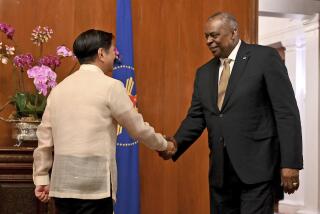Manila Panel Rejects Ban on American Bases : Constitution Writers Will Leave Decision to Aquino; Voters May Get Issue
- Share via
MANILA — A leftist-backed proposal for a constitutional ban on U.S. military bases in the Philippines was defeated Thursday by a special presidential commission drafting a new constitution.
Instead, the commission left to President Corazon Aquino the decision whether to renegotiate the U.S. bases agreement, which expires in 1991. Aquino, now visiting Washington, has declined to take a position on the bases’ future, saying she will leave her “options open” until it is time to consider renegotiating the agreement.
The vote against the ban on the bases was 29 to 15.
“Mrs. Aquino has asked to keep her options open on the bases,” said Blas Ople, a member of the commission and labor minister in the government of ousted President Ferdinand E. Marcos. “We have done that.”
Ratification Steps
Any new agreement on the bases would need approval by the Philippine Senate, the commission decided, and, if the Philippine Congress requires it, by a referendum of the people.
The initial proposal also called on the government to establish “a zone of peace, freedom and neutrality” with other Southeast Asian nations.
Commissioner Felicitas Aquino, a supporter of the ban, accused the conservative majority on the 48-seat assembly of “underhanded tactics” in rejecting the ban on bases and the neutrality clause.
Earlier this week, the majority rejected a proposal by the self-proclaimed nationalist bloc to delay a vote on the base issue until President Aquino returns next week from her current visit to the United States.
The commission’s president, Cecilia Munoz-Palma, replied that the body is charged with “writing a new constitution for all times, and the commissioners are expected to vote on issues free from any influence or pressure, and free from any consideration to favor any particular official or private party. In short, the U.S. visit of President Aquino should not affect or influence in any manner the actuations or proceedings.”
Air, Naval Bases
The United States maintains two major bases here--Subic Bay Naval Base, the sprawling logistics and repair center for the U.S. 7th Fleet, and Clark Air Base, home of the 13th Air Force--plus several smaller installations, under an agreement pledging more than $900 million in U.S. aid to the Philippines over a five-year period.
The commission majority deleted all references to the bases from the guiding Declaration of Principles of the proposed constitution. But, in a section on “transitory provisions,” it included a clause saying no foreign bases would be allowed after 1991 “except in accordance with a new treaty.”
“After the expiration of the RP (Republic of the Philippines)-U.S. bases agreement in 1991, foreign military bases, troops or facilities shall not be allowed in any Philippine territory except in accordance with a new treaty duly concurred by the (Philippine) Senate and, when Congress so requires, ratified by the people in a referendum or plebiscite called for that purpose,” the provision said.
Francisco Rodrigo, a leader of the conservative majority, said the provision was directed specifically at the U.S. bases. If the bases agreement is not renewed after 1991, he said, the American facilities will thereafter be banned. No other foreign bases would be permitted in any case.
He argued against the inclusion of any military-bases provision in the Declaration of Principles as a restraint on the executive power of government. “Why should we hamstring her (President Aquino) in any future negotiations?” he said.
Many Want Removal
Many members of the majority said they want the eventual removal of the U.S. bases, and most insisted that the Philippine government should exact better financial terms for a renewed agreement after 1991. Others cited security needs for retaining both Subic and Clark, the two largest U.S. military installations outside the continental United States.
Today, the commission is expected to take up another controversial proposal to make the Philippines “nuclear free.” The provision, despite its apparent bearing on the bases, has more support within the majority.
The commission began its deliberations on June 2, and two weeks ago passed the 90-day target date set by President Aquino. Commission members now say they are likely to complete their work in October. The document will then be submitted to a national referendum. If it is approved, national and local elections would be held early next year.
Aquino and her vice president, Salvador Laurel, are serving six-year terms and would not be required to run in such elections.
Could Endanger Approval
Several commission members argued against inclusion of a bases ban on grounds that it would make the entire document controversial and endanger its approval in the referendum. If the constitution were disapproved, that would leave the country without a basic law other than the “freedom constitution” that Aquino declared shortly after Marcos was driven from the country by a military coup and popular uprising in late February.
Earlier in the week, Ople suggested that the bases issue be eliminated entirely from the document and raised separately in a referendum in 1988, when Philippine and U.S. negotiators are expected to begin discussing a possible renewal of the base agreement.
“What is paramount is not to cripple the Philippine government by denying it the only political leverage it’s had with the United States since 1898 (when American forces drove Spanish forces from the Philippines and claimed it as a colony),” Ople said.
More to Read
Sign up for Essential California
The most important California stories and recommendations in your inbox every morning.
You may occasionally receive promotional content from the Los Angeles Times.













